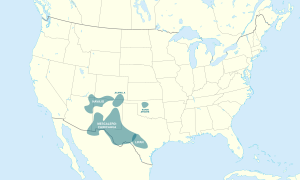Plains Apache language facts for kids
Quick facts for kids Plains Apache |
||||
|---|---|---|---|---|
| Kiowa Apache | ||||
| Native to | United States | |||
| Region | Caddo County, Oklahoma | |||
| Ethnicity | Plains Apache | |||
| Extinct | 2008 | |||
| Language family |
Dené–Yeniseian?
|
|||

Historical distribution of Southern Athabaskan languages. Plains Apache (labeled Kiowa Apache) is located in northwestern Oklahoma.
|
||||
|
||||
The Plains Apache language (also called Kiowa Apache language) was a special language spoken by the Plains Apache people. They lived mostly around Anadarko in southwest Oklahoma. Sadly, this language became extinct in 2008. This happened when Alfred Chalepah, Jr., the very last person who spoke it as their first language, passed away.
Plains Apache is part of a larger group called the Southern Athabaskan languages. Other languages in this family include Navajo, Chiricahua Apache, and Western Apache. These languages are known for having very complex verbs. Sometimes, just one verb can be a whole sentence!
Contents
What Made Plains Apache Special?
Sounds of the Language
Every language has its own unique sounds. Plains Apache had many different consonant sounds, much like its relatives, Navajo and Western Apache. Imagine sounds like 'p', 't', 'k', but also some sounds that are a bit like 'tl' or 'ch'.
The language also had four main vowel sounds. These were like 'i', 'e', 'o', and 'a'. What made them special is that they could be either short or long. Think of the 'a' in "cat" (short) versus the 'a' in "car" (long). Also, vowels could be spoken with air coming out of your nose, which is called nasalization.
Speaking with Tone
Plains Apache used something called tone. This means the pitch of your voice when you say a word could change its meaning. It had two main tones: low and high. For example, saying a word with a low pitch might mean one thing, while saying the same word with a high pitch could mean something completely different. If a vowel was long, it could even have two tones, like high-low or low-high, making the language sound very musical!
How Words are Built: Nouns
In Plains Apache, nouns (words for people, places, or things) could often show who owned them. This was done by adding small parts, called prefixes, to the beginning of the noun.
For example, if you wanted to say "my hoop," "your hoop," or "his hoop," you would add a different prefix to the word for "hoop." There were even special prefixes for when you didn't know who owned something, or for when the owner was someone you didn't know very well.
Parts of the Body and Ownership
Some nouns, especially those for body parts, were always "owned." You couldn't just say "lips" by itself. You had to say "his lips" or "someone's lips." This is called inalienable possession. It's like how you can't really separate a hand from a person.
But sometimes, you could talk about something that was alienably possessed. This means it's something you own but isn't part of you, like "his fat" (from an animal he hunted) versus "his fat" (which is part of his own body).
How Words are Built: Verbs
Plains Apache verbs were very complex. They could change a lot to show who was doing the action, when it happened, and how it was done. Because of this, one single verb could often form a complete sentence all by itself!
Imagine a verb that means "to give." In Plains Apache, you could add small pieces to it to say "He gives it to me" all in one word. Or another example, a single verb could mean "They two are boiling me." This shows how much information could be packed into just one verb.
How Sentences are Put Together
Plains Apache usually put words in a specific order: the subject (who or what is doing the action) came first, then the object (who or what the action is done to), and finally the verb (the action word). So, you might say "Man water boils" instead of "The man boils water."
Also, instead of using words like "on" or "in" before a noun (which are called prepositions in English), Plains Apache used postpositions. These words came after the noun. So, you might say "back on" instead of "on back."
However, because the verbs were so complex, a sentence could sometimes be just one word, like a verb that means "Each one of us is starting off to war."
Plains Apache didn't have words like "the" or "a," or separate words for adjectives like "big" or "small." Instead, they would combine nouns or use special verb forms to describe things. For example, to say "zebra" or "tiger," they might use a word that means "marks are on it."
See also
 In Spanish: Idioma apache kiowa para niños
In Spanish: Idioma apache kiowa para niños
 | Stephanie Wilson |
 | Charles Bolden |
 | Ronald McNair |
 | Frederick D. Gregory |

